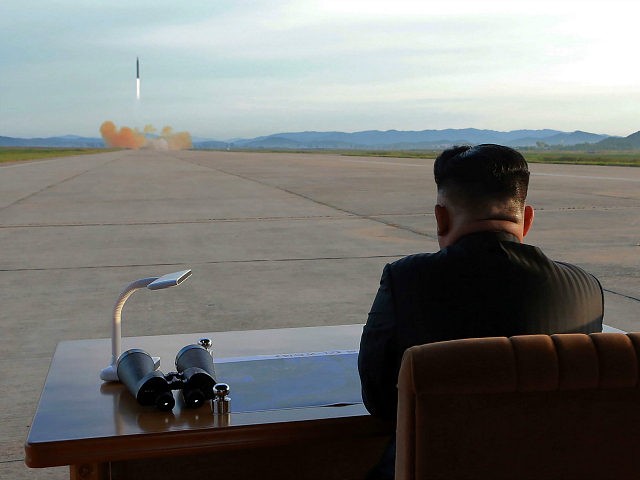The State Department’s special envoy for North Korea, Stephen Biegun, admitted in remarks Thursday that Washington and Pyongyang “do not have a specific and agreed definition of what final, fully verified denuclearisation” means, hindering talks to end the communist regime’s illegal nuclear program.
Biegun will travel to South Korea this weekend to meet with leaders there. The State Department generally is working on setting up logistics for a second in-person meeting between American President Donald Trump and communist dictator Kim Jong-un, which the White House recently stated is expected to occur in late February.
President Trump confirmed preparations for the meeting were underway in a statement on Twitter this week.
Biegun, speaking at Stanford University, said that the North Korean regime had promised to destroy its nuclear enrichment facilities, but noted no timeline yet existed for the project. BBC reports that the North Koreans offered this concession to Secretary of State Mike Pompeo in a meeting in October while noting that North Korean officials have not made any public statements promising they would dismantle any enrichment facilities.
North Korea orchestrated the dramatic shutdown of its nuclear test site, Punggye-ri, last year, banning nuclear experts from visiting the site but allowing international journalists with no nuclear science background to watch minor explosions detonate at the front of the facility. Biegun described Punggye-ri as “not [a] critical part of the current North Korean missile or nuclear programs.”
Pyongyang has not made any moves regarding Yongbyon, the nation’s only known enrichment facility. The most recent satellite images of Yongbyon available in the West indicate that workers are still ensuring that the facility is maintained functional, shoveling snow away from it and engaging in other custodial efforts.
Biegun noted, however, that the promise to end its nuclear program did not come with an agreed-upon definition of what denuclearization will look like for North Korea.
“We do not have a specific and agreed definition of what final, fully verified denuclearisation or comprehensive, verifiable, irreversible denuclearisation – whatever your preferred term of art – is,” he admitted.
The United States has repeatedly attempted to define “denuclearization” as an end to North Korea’s illegal nuclear program, including measures to make sure Pyongyang cannot pick up its research where it left off in the event of a transition of power or if Kim changes his mind. North Korea, on the other hand, has repeatedly defined “denuclearization” as the full removal of American troops from the Korean peninsula, including South Korea. Pyongyang contends that, as the United States possesses nuclear weapons, the true “nuclear threat” in the region is the presence of Americans at all.
At the very least, Washington has made clear that North Korea needs to provide a full and honest list of all its nuclear facilities and assets for a deal that will result in lifting sanctions on the rogue state, according to the envoy. Biegun insisted that the United States was interested in moving forward towards helping North Korea escape the destitution of its communist system in a future where denuclearization had completely occurred.
“With the completion of denuclearization, we are prepared to explore with North Korea and many other countries the best way to mobilize investment, improve infrastructure, enhance food security and drive a level of economic engagement that will allow the North Korean people to fully share in the rich future of their Asian neighbors,” he said. “This prosperity, along with the denuclearization and peace, lies at the core of President Trump’s vision for U.S.-North Korea relations.”
In his remarks Thursday, Trump expressed similar optimism, calling the relationship with North Korea the “best it has ever been.”
“No testing, getting remains, hostages returned. Decent chance of Denuclearization,” the president wrote. “Time will tell what will happen with North Korea, but at the end of the previous administration, relationship was horrendous and very bad things were about to happen. Now a whole different story.”
Trump told reporters on Thursday that the White House will announce the details of his scheduled meeting with Kim “early next week.”
North Korean state media, the only legal media in the country, has maintained silence on the issue for much of the past month. A government outlet published internationally, Choson Sinbo, made remarks Friday calling the upcoming summit a “historic meeting” and also expressing hope that the meeting would be a positive development for the Kim regime.
“There was a stalemate in the latter part of last year but if both sides draw up action plans based on the spirit of the joint statement adopted in their first summit, they could make a marked advance in relations,” the publication suggested.

COMMENTS
Please let us know if you're having issues with commenting.